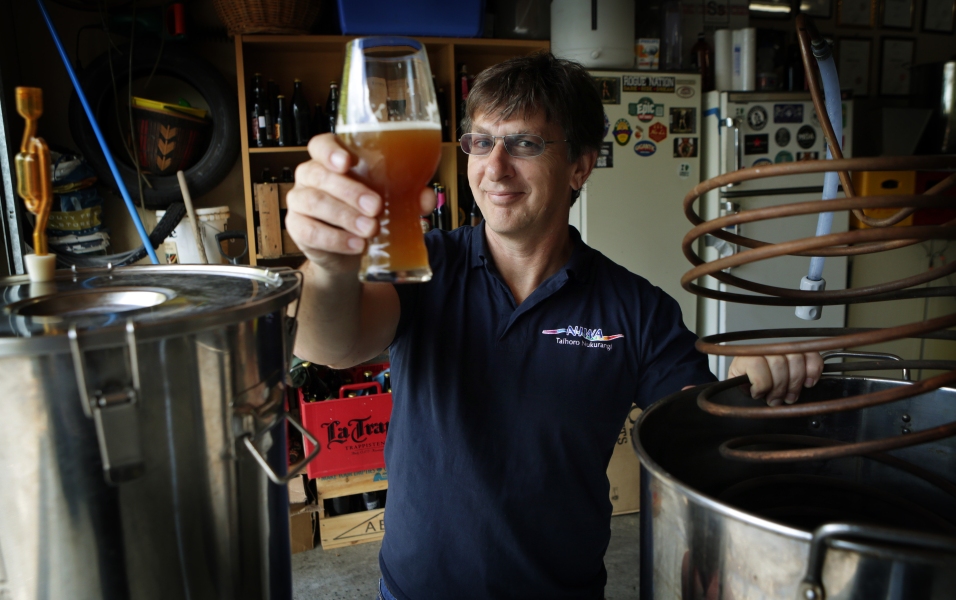Karl Safi is reluctant to say brewing beer is a science. He thinks it is more accurate – and important – to describe it is a combination of science and art.
But he will admit his day job as a microbial ecologist definitely helps with his weekend hobby. In November, at the National Homebrew Competition, Karl was awarded the prestigious title of Champion Brewer by the Society of Beer Advocates. He entered 16 beers and won 12 medals, in a year the judges said the standard was higher than ever.
Karl works at NIWA’s Hamilton office, you’ll most likely find him in a science lab or out in the field where he conducts research into algae, climate change and ocean acidification among other topics.
Currently his main focus is monitoring research into long-term trends of micro zooplankton and phytoplankton populations and the microbial composition of wastewater.
It requires precision, understanding subtle changes that can make big differences and how one process affects everything else with increasing complexity – all of which doesn’t sound too different to making beer.
“The key thing is that I have a microbiology background so I understand the importance of keeping things sterile and clean. Yeast, the organism used to make beer, is a similar sort of micro-organism to algae so I suppose I have an understanding in how to deal with themt.
“Applying good microbiological practices to my beer means I can make it consistently and make it well.”
Also Karl says he’s drunk a lot of beer from a lot of places and that research has given him an understanding of flavour.
“An experienced palate is really critical to understanding whether the beer you’ve made is a good beer or not.”
Tip number one to making a good homebrew: drink a lot of other people’s beer.
This is because Karl reckons a lot of people taste their own beer, think it’s fantastic, then get it judged and are horribly disappointed when they’re told it’s not up to scratch.
“Going to tastings and listening to judges at competitions, and even standing around trying each other’s beers helps you realise what was meant by the faults the judges picked up. The feedback you get from competitions is really important. You get to understand what makes a good beer and the kind of faults that are quite common.”
Tip number two: don’t buy a kit from the supermarket if you want to make great beer. “It’s not going to win you any awards.”
Karl used to buy kits when he was at university mainly because it was a cheap way of getting beer but he gave up because “it wasn’t fabulous”. These days the ingredients you can buy to make beer are the same as the professionals use so you can do better.
“Ten years ago you were hard-pushed to find good grain of a quality you could use but with the internet there are good suppliers with all the elements you need to make good home brew beer.”
Karl mills his own grain with a hand mill. It takes a day for him to lay down a brew, a couple more weeks for it to ferment, and about six to eight weeks before it has matured enough to drink.
Tip number three: use full grain.
Tip number four: temperature control. It’s critical. You need a temperature control on your fridge but you can buy them pretty cheaply. Also you don’t need expensive gear for beer. He uses pots and chilly bins and makes it in his garage. At the weekend. Karl insists this his is a weekend hobby only.
He has been brewing beer in his garage for about six years. His brother got him interested in the full grain brewing process and he kind of went from there. Being crowned Champion Brewer means receiving a brewing scholarship to spend time at a micro brewery which will turn one of his brews into a commercial beer.
“If it sells well there’s the opportunity to do another batch. It’s a great opportunity and the idea is to foster people interested into getting into the industry. But I’m very realistic about how far you can go.
“You have to be very good to get into the market and realistically people who run micro breweries are willing to take a big risk and put up a lot of capital.”
Right now Karl’s favourite beer is an Indian Pale Ale. He says it’s regarded as quite trendy at the moment but dates back to when beer was once shipped from England to India and they put more hops in it to make it last.
He likes big flavours and also has a particular fondness for Belgian beers. He’s been to Belgium where many are associated with monasteries and have been crafted over centuries.
“They use open fermenters but over the years they’ve developed so much. It’s all wooden walls which are coated with yeast, which then reinfects their batches, so by chance over a long time they have self-culturing systems. It’s an interesting way of doing it.”
Tip number five: practice helps. You need to keep trying, keep talking to people, join an online forum, keep good notes.
“The major thing is trying to get consistency in what you make and being able to reproduce it.”
Home brewing definitely has its complexities but there are plenty of clubs and friendly, enthusiastic brewers keen to share their knowledge and drink beer.
Karl’s one of them. He likes beer but makes too much to drink it all himself. He gives a lot away - and worse.
“I hate to say this but I do end up throwing some away.”


